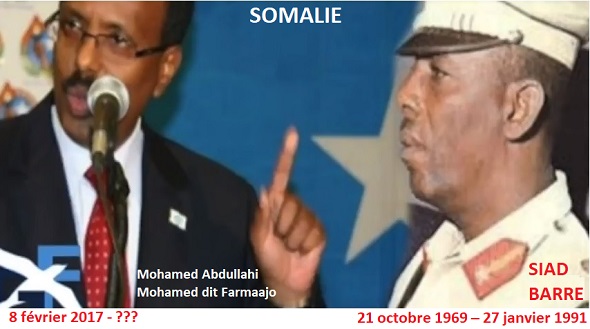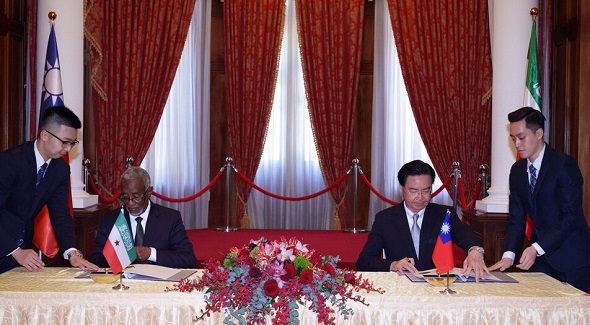
Djibouti/Somaliland : Guelleh cible tout ce qui s’oppose au projet de la future base navale éthiopienne en Somaliland.
 Le colonel Mohamed Djama Doualeh, chef de la garde républicaine de Djibouti, et le colonel Ibrahim Zakaria Cheik Ibrahim, directeur des relations internationales des forces armées djiboutiennes, se sont déplacé à la frontière e Lowyada la journée du 28 janvier 2024.
Le colonel Mohamed Djama Doualeh, chef de la garde républicaine de Djibouti, et le colonel Ibrahim Zakaria Cheik Ibrahim, directeur des relations internationales des forces armées djiboutiennes, se sont déplacé à la frontière e Lowyada la journée du 28 janvier 2024.
Les deux officiers précités ont remis au commandement de l’armée nationale djiboutienne chargée de la surveillance de la frontière de lowyada une note spécialement sortie de la présidence de Djibouti. Cette note contient une liste des noms des personnes cibles que l’armée nationale chargée de la surveillance de la frontière doit les interpeller et même les abattre si ces personnes cibles se présentaient à la frontière de Djibouti.
Les personnes cibles qui apparaissaient sur la note sont en majeur parties des natifs des villes de Lughaya et Borama, en Somaliland. Quand nous nous sommes renseignés auprès des proches de la présidence, on nous apprend que les personnes cibles mentionnées sur la note susmentionnée sont des citoyens somaliens des ethnies Issa et Gadabursi qui ont manifesté, avec arme à l’épaule, pour dénoncer ou démontrer publiquement leurs oppositions au fait que Muse Bihi Abdi, le président de la République de Somalialnd, a octroyé le 1er janvier 2024 une base militaire à la future force marine de l’Éthiopie.
Cette future base navale Éthiopie devra être installée entre Lughaya et Berbera, en Somaliland, mais la population de ces localités est opposée ainsi que l’état fédéral de la Somalie dont la Somaliland fait partie intégrante.
Donc, quel intérêt pour le régime de Guelleh de cibler ces personnes natives de Lugahya et Borama ?
Les sources nous disent que le régime d’Ismaël Omar Guelleh soutient le projet de la future base navale Éthiopie à Lughaya.
À suivre…
HCH
Djibouti/Somaliland: Guelleh targets anything that opposes the planned Ethiopian naval base in Somaliland.
Colonel Mohamed Djama Doualeh, head of Djibouti’s Republican Guard, and Colonel Ibrahim Zakaria Cheik Ibrahim, Director of International Relations for the relations of the Djibouti armed forces, visited the Lowyada border on January 28 2024.
The two officers handed over to the command of the Djibouti national army in charge of surveillance surveillance of the Lowyada border a note specially issued by the Djibouti presidency. This note contained a list of the names of the people that the national army in charge of guarding the border should question to question them and even shoot them if these target persons turned up at the Djibouti border. Djibouti border.
The target persons listed on the note are mostly natives of the Somaliland towns of Lughaya and Borama. When we made enquiries with those close to the Presidency, we were told that the target persons mentioned on the above-mentioned note were Somali citizens of the Issa and Gadabursi ethnic groups who had demonstrated, with weapons at the ready, to denounce or publicly demonstrate their opposition to the fact that Muse Bihi Abdi, President of the Republic of Somalialnd, had granted a military base to the future Ethiopian naval force on January 1, 2024.
This future Ethiopian naval base is to be set up between Lughaya and Berbera, in Somaliland, but the population of these localities is opposed, as is the federal state of Somalia, of which Somaliland is an integral part.
So what’s the point of Guelleh’s regime targeting the people of Lugahya and Borama?
Sources tell us that Ismaël Omar Guelleh’s regime supports the project for the future Ethiopian naval base at Lughaya.
To be continued…
HCH
Share


 Previous Article
Previous Article Next Article
Next Article Somalie / Somaliland : Comment le président Mohamed Abdullahi Mohamed dit Farmaajo sabote les discussions entre Mogadiscio et Hargeisa.
Somalie / Somaliland : Comment le président Mohamed Abdullahi Mohamed dit Farmaajo sabote les discussions entre Mogadiscio et Hargeisa.  Surfer Audio Post
Surfer Audio Post  Éthiopie: la fête de l’Aïd sous tension
Éthiopie: la fête de l’Aïd sous tension  Somaliland/Taïwan : Aurait-il bientôt une reconnaissance mutuelle entre Hargeisa et Taipei ?
Somaliland/Taïwan : Aurait-il bientôt une reconnaissance mutuelle entre Hargeisa et Taipei ?  Don’t Forget To Stretch After Your Workout
Don’t Forget To Stretch After Your Workout  Djibouti : La RTD parle des problèmes techniques quand le régime clanico-mafieux parle de sabotage.
Djibouti : La RTD parle des problèmes techniques quand le régime clanico-mafieux parle de sabotage.  Djibouti/CORONAVIRUS : Guelleh a ordonné de cacher les personnes décédées du coronavirus.
Djibouti/CORONAVIRUS : Guelleh a ordonné de cacher les personnes décédées du coronavirus.  20 Healthy Sandwich Recipes
20 Healthy Sandwich Recipes